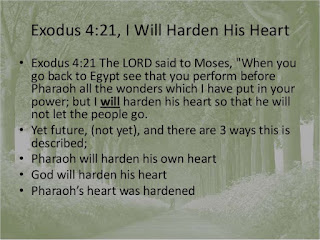THE LIVES OF THE PATRIARCHS #73 | THE LIFE OF MOSES #55
Pastor Christopher Choo
Lesson 3756
THE LIVES OF THE PATRIARCHS #73
THE LIFE OF MOSES #55
MOSES VS. PHAROAH ( PART 1)
WHY DID PHAROAH RESIST MOSES?
The Bible gives us two reasons:
1. Pharoah was a stubborn person.
2. God hardened his heart.
A. Introduction
The first Bible’s mention of Pharaoh’s resistance was a prediction by God Himself, when He spoke with Moses in the wilderness: “I know that the king of Egypt will not let you go unless a mighty hand compels him” (Exodus 3:19).
Soon after that prediction, the Lord said to Moses, “I will harden his heart, so that he will not let the people go” (Exodus 4:21).
From the burning bush, God spoke of two reasons for Pharaoh’s resistance to Moses: the king’s own stubbornness and a supernatural hardening of the king’s heart after Pharaoh exercised his own defiance toward God.
In those ancient days, the Pharaoh was considered a god, and his every word was law. There was no one who could stand against Pharaoh, so the Lord used him to demonstrate His own superior power.
The Lord’s plan to use plagues and miracles to free the nation of Israel was not conceived in reaction to Pharaoh’s rebellion.
God had planned the Exodus long ago - in a prophecy he shared with Abraham that his descendants will be enslaved in another nation.
Genesis 15:13-14
13.Then the LORD said to him, "Know for certain that your descendants will be strangers in a country not their own, and they will be enslaved and mistreated four hundred years.
14 But I will punish the nation they serve as slaves, and afterward they will come out with great possessions."
God is never reactive; He is always proactive. He had orchestrated the back-and-forth with Pharaoh and the Exodus from the very beginning (see Isaiah 46:10).
Four hundred years prior to the Exodus, Joseph prophesied on his deathbed that God would lead His people out of Egypt to the Promised Land, and he made his relatives promise to carry his bones with them when they went (Genesis 50:24–25).
Seen as a symbol of the world’s ungodly system, Egypt represents the enemies of the Lord (cf. Ezekiel 29:1–6).
God used Pharaoh’s hardheartedness to showcase His own glory and to show the world His supremacy over all the kings of the earth (Psalm 2:10–11; Ezekiel 20:9; 36:22)
B. Observation
We can see that Moses had many formidable enemies.
From his own people, we studied the likes of Korah, Miriam and Aaron who rebelled against Moses' leadership.
Now we embark on his most powerful and treacherous enemy - Pharoah himself.
This Egyptian king had a sizeable slave community in the Israelites to do all his grandiose building works for free.
So he was reluctant to let them go.
In this series we will see the importance of godly leadership in the life of Moses.
He may have his faults and a speech defect. But he finally obeyed God's call at 80 to lead his people out of captivity.
But he had two advantages: he was humbler than Miriam and Aaron, and he spoke to God " face to face."
Before God and man, he was prepared with such disarming qualities to take on Pharaoh the most powerful monarch at that moment of time.
As Paul said - if God is for us, who can be against us?
Romans 8:31
31 What, then, shall we say in response to these things? If God is for us, who can be against us?
N.B.
The vexed question remains for discussion - about God's hardening of Pharoah's heart as if he had no free will as such to resist Moses and God.
This leads to the wrong inference that God is biased and unfair.
Hence we shall be discussing this topic in our next devotion. Please stay tuned.


